 Petzlover
Petzlover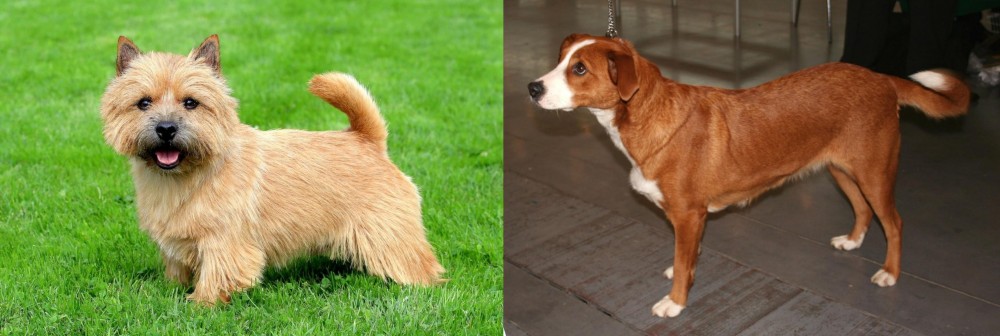 Nova Scotia Duck-Tolling Retriever is originated from Canada but Osterreichischer Kurzhaariger Pinscher is originated from Austria. Both Nova Scotia Duck-Tolling Retriever and Osterreichischer Kurzhaariger Pinscher are having almost same height. Both Nova Scotia Duck-Tolling Retriever and Osterreichischer Kurzhaariger Pinscher are having almost same weight. Both Nova Scotia Duck-Tolling Retriever and Osterreichischer Kurzhaariger Pinscher has same life span. Nova Scotia Duck-Tolling Retriever may have more litter size than Osterreichischer Kurzhaariger Pinscher. Both Nova Scotia Duck-Tolling Retriever and Osterreichischer Kurzhaariger Pinscher requires Moderate Maintenance.
Nova Scotia Duck-Tolling Retriever is originated from Canada but Osterreichischer Kurzhaariger Pinscher is originated from Austria. Both Nova Scotia Duck-Tolling Retriever and Osterreichischer Kurzhaariger Pinscher are having almost same height. Both Nova Scotia Duck-Tolling Retriever and Osterreichischer Kurzhaariger Pinscher are having almost same weight. Both Nova Scotia Duck-Tolling Retriever and Osterreichischer Kurzhaariger Pinscher has same life span. Nova Scotia Duck-Tolling Retriever may have more litter size than Osterreichischer Kurzhaariger Pinscher. Both Nova Scotia Duck-Tolling Retriever and Osterreichischer Kurzhaariger Pinscher requires Moderate Maintenance.
 The Nova Scotia Duck Tolling Retriever dog was bred in the 19th-century in Nova Scotia, Eastern Canada.
The Nova Scotia Duck Tolling Retriever dog was bred in the 19th-century in Nova Scotia, Eastern Canada.
They were used as hunting dogs. Known as the ‘Toller’, the dog was at first referred to as the Little River Duck Dog but it was in 1945 that it became officially recognized by the Canadian Kennel Club as a pure breed.
The dog is a mix of retriever, setter, spaniel and possibly a farm collie mix breed. It was in 1980 that the breed gained national recognition, being declared the provincial dog of Nova Scotia in 1995.
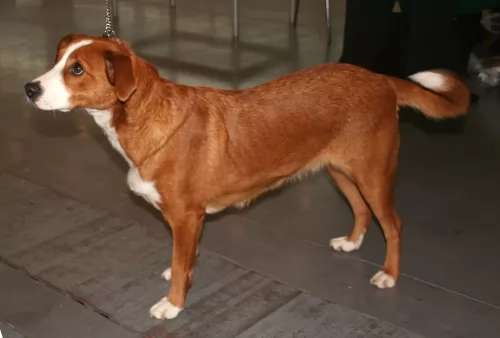 Hailing from Austria, the Osterreichischer Kurzhaariger Pinscher, better known as the Austrian Short-Haired Pinscher has always been depicted on paintings from the Baroque period.
Hailing from Austria, the Osterreichischer Kurzhaariger Pinscher, better known as the Austrian Short-Haired Pinscher has always been depicted on paintings from the Baroque period.
The dog is a terrier-type canine and has always been used as a watchdog but he was also used to hunt because of the terrier qualities he possesses.
This dog has always been used for working on farms. Breeding of this dog started in 1921 and the dog was recognized by the United Kennel Club in 2006.
 The Nova Scotia Duck Tolling Retriever is a medium-sized gundog. Both male and female stand at about 42 to 54cm in height and they weigh anything from 17 to 23kg.
The Nova Scotia Duck Tolling Retriever is a medium-sized gundog. Both male and female stand at about 42 to 54cm in height and they weigh anything from 17 to 23kg.
This beautiful dog is looked upon as the smallest of the retriever dogs. He has a remarkable medium-length, feathery red, copper or golden coat with some white markings and a long feathery tail with medium length, floppy ears. The coat will need brushing twice a week.
He is a powerful dog and also agile with a somewhat worried expression on his face. The expression becomes bright and animated when he is busy working and you’ll notice that the feathery tail is held high with confidence and delight when he is busy working or doing some activity he loves.
The Nova Scotia Duck Tolling Retriever is an intelligent, alert dog who is eager to please its owners.
They are affectionate dogs too, making a splendid family pet. If you’ve got kids in the home, you can trust this dog to get on well with them.
He is energetic, thriving on both physical and mental stimulation. He’ll love a walk every day as this will give him the chance to get out and sniff around. He won’t be content though with just a walk and will want ball games, walks in the park, hikes and swimming. This dog loves water and is well equipped for it with his double coat and webbed paws.
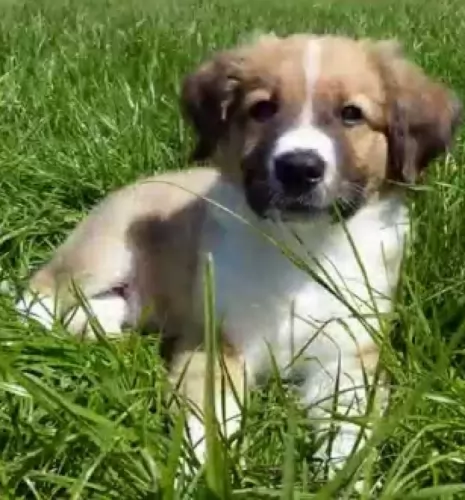 As a medium sized dog, both males and females stand at between 42 and 50cm in height and the dog weighs roughly between 14 and 20kg.
As a medium sized dog, both males and females stand at between 42 and 50cm in height and the dog weighs roughly between 14 and 20kg.
The coat is shortish, dense and smooth and is essentially black and tan with some white, fawn or brindle. The ears of the dog are fairly short and they look as though they wanted to be erect but then decided to be floppy. The nose is black and the eyes dark brown.
The tail is usually docked but when it is left long, it curls over the back. If you want your dog to be bred you can expect between 4 – 6 puppies.
These are playful dogs, getting on well with their human families and wanting to get involved in their activities. They are suspicious of strangers. They are good with kids, making them a good playmate, but they don’t like small children being allowed to climb over them.
They are able to get along well with any other pets in the house. It would be to your benefit to have the dog trained and socialized as he becomes obedient and good around people in social settings. He is an intelligent dog and will find training easy.
They also take their role as guardian and protector seriously.Because he was bred to be a farm dog, he wouldn’t e able to adapt to life on a tiny property in the city.
 Your Toller is a high energy dog, and with the right family he is going to be an absolute joy to have. Give him lots of activities to stimulate him physically and mentally as he is an intelligent dog.
Your Toller is a high energy dog, and with the right family he is going to be an absolute joy to have. Give him lots of activities to stimulate him physically and mentally as he is an intelligent dog.
He is playful and social and full of life, although he is wary around strangers. Just like with most dogs, he will need training and socialization to round him off, making him obedient and well balanced.
With this good-natured pet, you will have a wonderful family friend and enthusiastic sport companion.
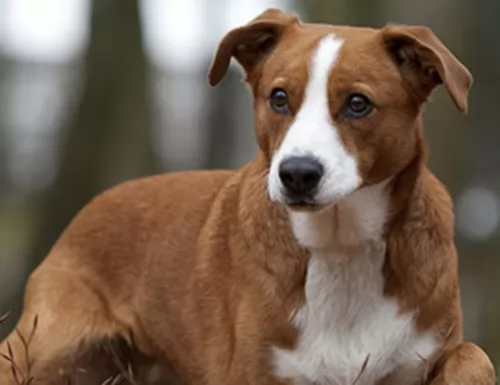 Have your Osterreichischer Kurzhaariger Pinscher trained and socialized if you want him to be amicable and obedient around you and your visitors.
Have your Osterreichischer Kurzhaariger Pinscher trained and socialized if you want him to be amicable and obedient around you and your visitors.
He does well with a human family who are firm, kind and patient with him. He loves to be kept busy with both mental and physical exercise, thriving on challenging activities, and he will become frustrated if he is left day after day just to lie around.
Take him with you on walks, buy him nice chewy, stimulating toys, throw a ball or frisbee with him and include him in your activities.
This is a dog more suited to life in the countryside as opposed to life in the city. Care well for this splendid family pet and you’ll quickly begin to see why dogs like him are known as man’s best friend.
 These dogs are robust, but certain genetic disorders do occur in the breed because of the smallish gene pool. Some of the biggest health problems they face are hip dysplasia and progressive retinal atrophy.
These dogs are robust, but certain genetic disorders do occur in the breed because of the smallish gene pool. Some of the biggest health problems they face are hip dysplasia and progressive retinal atrophy.
This eye disease is all about a group of degenerative eye disorders that cause blindness in both eyes of the dog.
The first symptom of this disease is night blindness where you see your dog being reluctant to go outside or to go up and down stairs in dim light. The surface of the eyes will get that cloudy, glazed-over look and as the disease progresses, you’ll find your pet bumping into things.
Mercifully it isn’t painful but you will need to get your pet to the vet to manage the condition.
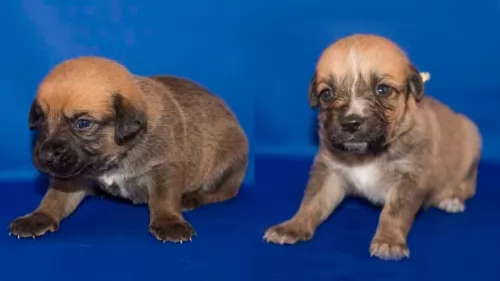 The Austrian Short-haired Pinscher is a robust kind of dog that isn’t going to have you rushing to the vet very often. True, he does have some hereditary health issues but it is highly unlikely that you will find these health issues in your pet.
The Austrian Short-haired Pinscher is a robust kind of dog that isn’t going to have you rushing to the vet very often. True, he does have some hereditary health issues but it is highly unlikely that you will find these health issues in your pet.
Nonetheless it pays to know about one of the more serious conditions -
This is a heart disease that is present from birth and could have been passed down from the parent dog to the puppy. A congenital heart defect occurs as a malformation of any valve, with the most common congenital heart diseases in dogs being patent ductus arteriosus, pulmonic stenosis as well as subaortic stenosis, all potentially inherited defects.
Sometimes a dog can live a fairly normal life with this disease but other times there are complications which can lead to congestive heart failure and atrial fibrillation, causing symptoms such as difficulty with breathing, cough and weakness. Your dog will need to get to the vet to discuss treatment options.
 Tollers are energetic dogs and you won’t have to extend a second invitation to this dog to join you on your walks, hikes, hunting and swimming. It is perhaps why he is better suited to country living as opposed to living in the city.
Tollers are energetic dogs and you won’t have to extend a second invitation to this dog to join you on your walks, hikes, hunting and swimming. It is perhaps why he is better suited to country living as opposed to living in the city.
You want to ensure the best food for your four-legged friend, but the idea is to keep things simple and nutritious for your dog.
Your pet can’t tell you when he’s got a stomach-ache from eating the wrong foods so you have to be careful what you feed him. You want to make sure that the food you give your dog is balanced for the stage of life he or she is in – puppy, young adult, pregnancy, ill dog or senior dog.
You’ve also got to see whether your dog is small or large, active or a couch-potato type of dog, and choose commercially manufactured foods that cater for the kind of dog he is.
It is fine to feed your dog a kibble food or you can mix in some chopped up boiled chicken, brown rice or pasta and some vegetables such as carrots, sweet potatoes and spinach. Some raw meat added in when you can afford it, will also do your pet the world of good.
You can see from this diet, it is uncomplicated, plain, wholesome food and will do your pet good.
Always be careful of bones with your dog and speak to your vet first before you opt to give your dog bones.
Never leave your pet without a constant supply of fresh, cool water.
Both dogs and owners benefit when a dog has been trained and socialized. The dog is balanced and obedient and a stronger relationship develops between owner and dog because of the dog being well behaved. The Nova Scotia Duck-Tolling Retriever is an intelligent dog so he won’t have any trouble with training.
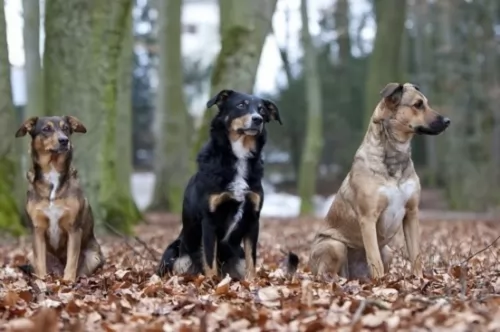 They need quite a lot of exercise, and even though they can adopt to life in the countryside or the city, they will require regular walks, ball- and rope games to prevent them becoming bored, frustrated and destructive.
They need quite a lot of exercise, and even though they can adopt to life in the countryside or the city, they will require regular walks, ball- and rope games to prevent them becoming bored, frustrated and destructive.
The Austrian Short-haired Pinscher sheds quite a bit so he will need to be brushed at least twice a week to remove the loose hairs.
As a medium sized, energetic dog, you want to ensure you maintain your dogs energetic nature by providing him with excellent food.
Choose your commercially manufactured food carefully as some of them are of a poor quality and can actually be detrimental to your dog’s health. Choose a high quality kibble that has quality ingredients.
Home-made food such as boiled chicken, brown rice or pasta and vegetables such as carrots, spinach and sweet potatoes all chopped up and added to his kibble occasionally will do wonders for this dog. He will thrive on also getting in some raw meat from time to time.
Ensure a constant supply of fresh, cool water.